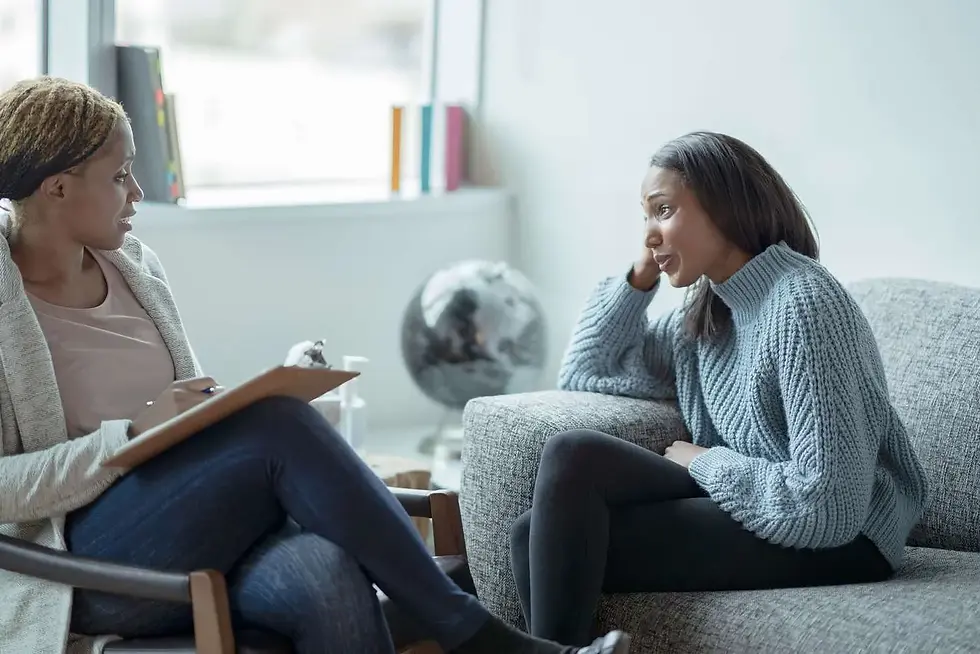Grief and Loss: The one thing we all experience, but don’t know what to do with it
- Kayla Bell-Consolver
- Oct 19, 2024
- 4 min read
I recently received a call from my grandmother, whom is my pride and joy, telling me that she “almost went home.” I remember pausing for a moment, confused on how it was possible that our time was dwindling this soon. My middle name comes from my grandmother, and my daughter’s name is another adaption from it, so in that moment, I felt a huge part of me grieving for all three of us. Being the therapist that I am, I help her process what that experience meant to her and how scary it could be. By the end of it, I could tell that she was more encouraged, but it left me thinking about how I also feel about it.

We all know that individuals pass away, logically, but there is an emotional component to it that feels challenging to navigate. I’ve connected with my parts, processed my thoughts with friends, and still find myself wondering about what this also means to me. The issue with grief is not the loss itself, but the expectation that we must do something with it beyond hold space for it.
We cannot run from, hide from, or distract ourselves enough from grief because it is so ever present in our lives, directly or indirectly. For example, COVID, ongoing death and murder in Israel, multiple hurricanes in Florida and the Caribbeans, mass shootings, friends and family members passing away or posting about loss on social media and witnessing many celebrities’ pass. It is all so constant. In addition, witnessing the relationships that we care for become more distant, which is also a form of loss.
Lately, I’ve found myself mentally checking out in moments and coming to the reality of my own mortality, which is strange to experience. I reflect on the type of life that I want to live and the impact that I want to have more often due to the reality of the losses around me. This can easily be an anxious place to be for many, including myself, because we are so connected to the present.
Overtime, I’ve realized that I am not alone in the thoughts of grief and feelings attached to it. The more I speak with people, the more I learn how many of us have direct experiences with grief and hold that pain inside. There is so much power in holding that grief with others, but there are many things that get in the way. I’ll name a few:
1) The fear that it will just be too much for us to handle
2) The worry that others won’t be able to hold it with us
3) Fear that we’re becoming a burden on others by not moving past the grief (which is again so hard when there’s reminders everywhere)
4) Not having the words to even describe what’s happened
If you can relate to any of these things, I want you to know that I hear you and get it. I spent most of my life running away from grief or the thought of it because it felt just too painful with no idea how to cope. The healing does not come from pushing it aside and moving forward, but rather allowing it to be seen, breathe, and supported.
The moment I learned about my grandmother’s close connection with death, I messaged my wife, family, and some close friends. Although I felt myself getting overwhelmed, sad, and avoidant with each conversation, I also felt space growing inside for me to hold and bear witness to my grief. It no longer felt like I was shrinking it into a box, but rather expanding the space for me to breath and notice that it is there. Writing has also been helpful for me, which is why I’m sharing it here.
You do not have to do what I did to process your grief or the anticipated grief. For some, talking feels redundant and too much, so you may find other ways to honor your feelings and hold space:
1) Art, music, or use of creativity
2) Physical activity
3) Holding an alter for them or reflecting on what it means for them to be an ancestor
4) Distracting yourself when it feels too much
5) Holding the positive memories of them. If you have pictures or photos, even better.
6) Celebrating them or what they meant to you in any way that feels good to you.
7) Sitting with it in chunks that feel good (i.e. setting a timer for how long you think or talk about it or allowing yourself to change focus if it gets to be too much)
This is not an exhaustive list and none of the items may feel like they resonate with you. That is okay! The point is to find what works best for you, and if you feel stuck doing so, community can be so helpful. Community can include family, friends, therapist, spiritual guides or supports, mentors, etc. When choosing community, make sure that they feel like community in your spirit as well.
How do you want to hold space for your grief?
Kayla Bell-Consolver, MS, LMHC
Pronouns: She/her
Where the Healing Begins







Comments